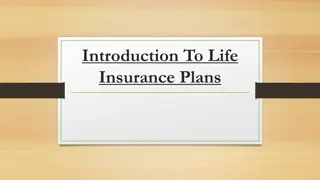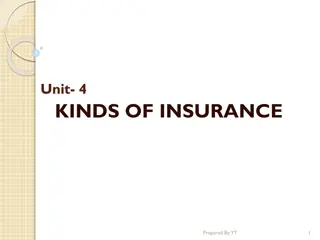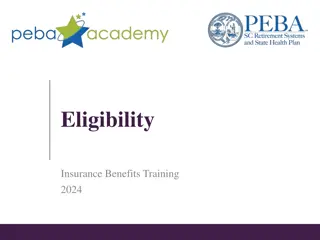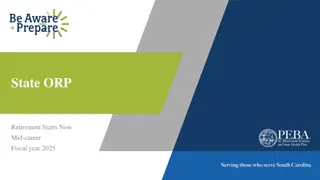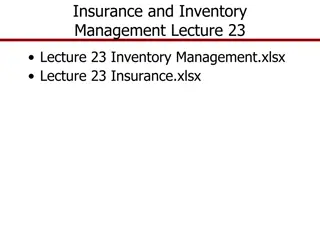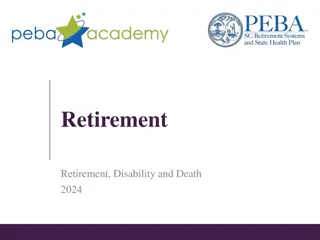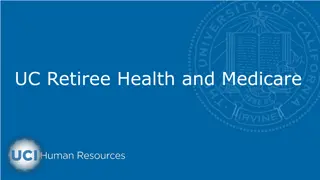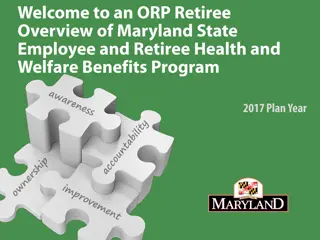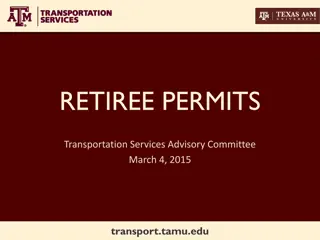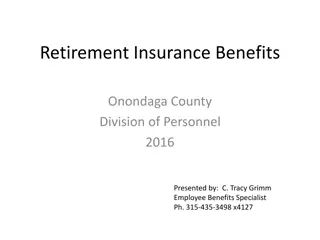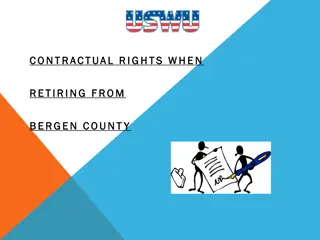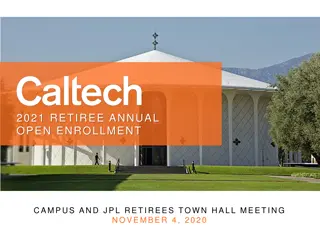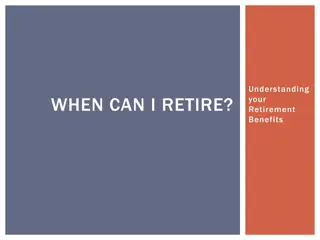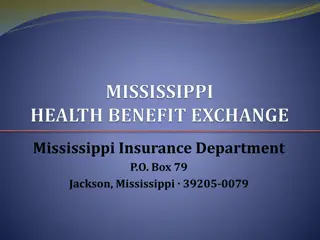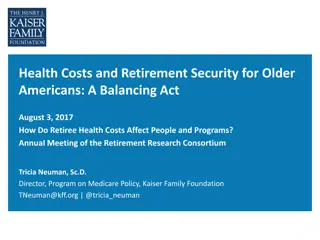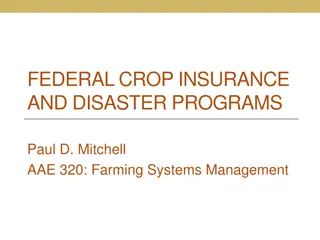Understanding Retiree Insurance Eligibility and Funding
Retiree insurance eligibility is a crucial aspect that retirees should understand before retiring. The process involves determining eligibility for retiree group insurance, which is separate from retirement eligibility. By meeting certain requirements such as having served consecutively in a full-time permanent position with a participating employer, retirees may qualify for state funding towards their insurance premiums. It is essential to submit necessary documents like an Employment Verification Record well in advance to begin the eligibility determination process. Make informed decisions by reviewing the provided information and resources.
Download Presentation

Please find below an Image/Link to download the presentation.
The content on the website is provided AS IS for your information and personal use only. It may not be sold, licensed, or shared on other websites without obtaining consent from the author. Download presentation by click this link. If you encounter any issues during the download, it is possible that the publisher has removed the file from their server.
E N D
Presentation Transcript
Retiree insurance and eligibility funding Get Set for Retirement | Insurance 2024
Important information This presentation is not a comprehensive description of the insurance benefits offered by PEBA. For more information, and before you make enrollment decisions, review the Insurance Benefits Guide. 2
Retiree insurance eligibility Eligibility for retiree group insurance is not the same as eligibility for retirement. Determining retiree insurance eligibility is complicated, and only PEBA can make that determination. The Retiree Packet, available at peba.sc.gov/forms, is a comprehensive packet that includes: Retiree Insurance Eligibility, Funding flyers; Employment Verification Record; Certification Regarding Tobacco or E-cigarette Use; and Other helpful information. Before you retire, submit an Employment Verification Record as early as six months prior to your retirement date to start the process PEBA uses to determine your eligibility for retiree insurance and any possible funding. 3
Requirement for any retiree coverage Regardless of how or when you qualify for retirement, to qualify for retiree group insurance, your last five years must be: Served consecutively; In a full-time, permanent position; and With an employer participating in the state insurance program. 4
Requirements for any retiree coverage Earned service credit is time earned and established in one of the defined benefit pension plans PEBA administers. Earned service credit does not include any purchased service credit not considered earned service in the retirement plans (e.g., non-qualified service). For State ORP participants and members whose employer does not participate in a PEBA-administered retirement plan, eligibility is determined as if the participant were a member of the South Carolina Retirement System (SCRS). This means one year of employment is equal to one year of earned service credit. 5
Retiree group insurance funding Retirees of state agencies, public higher education institutions, public school districts, charter schools that participate in both insurance and retirement or other employers that participate in the South Carolina Retirement Health Insurance Trust Fund may be eligible to receive state funding toward their premiums if they meet certain requirements. Optional employers, charter schools that participate in insurance only and employers that do not participate in the trust fund determine if their retirees pay all or part of the insurance premiums. Contact your benefits administrator for your premiums. Changing jobs could affect your eligibility for funding. See Retiree Insurance Eligibility, Funding flyers in the Navigating Your Benefits series for more information. 6
For employees hired into an insurance-eligible position before May 2, 2008 Retirees of state agencies, public higher education institutions, public school districts and charter schools that participate in both insurance and retirement1 Earned service credit with an employer participating in the State Health Plan Retirement status Responsibility for paying for premiums Left employment after reaching service or disability retirement eligibility You pay the full premium (employee and employer share). Five years, but less than 10 years You pay the employee share of the premium only. 10 years or more You are not eligible for retiree insurance coverage. Left employment before reaching retirement eligibility Less than 20 years You are eligible for coverage upon reaching retirement eligibility.2 You pay only the employee share of the premium. 20 years or more 1The employee must serve the last five years consecutively in a full-time, permanent position with an employer participating in the State Health Plan. 2Retirement eligibility means that you have met the minimum statutory requirements for retirement eligibility established for the plan in which you are a member. For State ORP participants and members whose employer does not participate in a PEBA-administered retirement plan, eligibility is determined as if the participant were a member of the South Carolina Retirement System (SCRS), including reaching retirement eligibility. 7
For employees hired into an insurance-eligible position on or after May 2, 2008 Retirees of state agencies, public higher education institutions, public school districts and charter schools that participate in both insurance and retirement1 Earned service credit with an employer participating in the State Health Plan Retirement status Responsibility for paying for premiums Left employment after reaching service or disability retirement eligibility You pay the full premium (employee and employer share). Five years, but less than 15 years You pay the employee share of the premium and 50% of the employer share of the premium. 15 years, but less than 25 years 25 years or more You pay only the employee share of the premium. Less than 20 years You are not eligible for retiree insurance coverage. Left employment before reaching retirement eligibility You are eligible for coverage upon reaching retirement eligibility.2 You pay the employee share of the premium and 50% of the employer share of the premium. 20 years, but less than 25 years You are eligible for coverage upon reaching retirement eligibility.2 You pay only the employee share of the premium. 25 years or more 1The employee must serve the last five years consecutively in a full-time, permanent position with an employer participating in the State Health Plan. 2Retirement eligibility means that you have met the minimum statutory requirements for retirement eligibility established for the plan in which you are a member. For State ORP participants and members whose employer does not participate in a PEBA-administered retirement plan, eligibility is determined as if the participant were a member of the South Carolina Retirement System (SCRS), including reaching retirement eligibility. 8
For employees hired into an insurance-eligible position with an optional employers or charter school that participate in insurance only1 Earned service credit with an employer participating in the State Health Plan Retirement status Responsibility for paying for premiums Left employment after reaching service or disability retirement eligibility Your portion of the premium, up to the full amount of the employee and employer share, is at your employer s discretion. At least five years Less than 20 years You are not eligible for retiree insurance coverage. Left employment before reaching retirement eligibility You are eligible for coverage upon reaching retirement eligibility.2 Your portion of the premium, up to the full amount of the employee and employer share, is at your employer s discretion. 20 years or more 1The employee must serve the last five years consecutively in a full-time, permanent position with an employer participating in the State Health Plan. 2Retirement eligibility means that you have met the minimum statutory requirements for retirement eligibility established for the plan in which you are a member. For State ORP participants and members whose employer does not participate in a PEBA-administered retirement plan, eligibility is determined as if the participant were a member of the South Carolina Retirement System (SCRS), including reaching retirement eligibility. 9
55/25 year rule If you are a Class Two member of SCRS who retires under the 55/25 early retirement provision, you must pay the full premium (employee and employer share) until: You reach age 60; or The date you would have reached 28 years of service credit had you not retired, whichever occurs first. You can refuse retiree insurance coverage and enroll when you become eligible for funding because you reach age 60 or at the date of what would be 28 years of service credit. 10
Financial disclaimer Personal finance, as the name implies, is a highly individualized and personal matter. The information provided in these presentations is general educational information provided to illustrate certain financial ideas and concepts. This information does not take into account your personal situation and should not be considered personal financial or investment advice. In reviewing this video, you should consider whether the information presented is appropriate for your particular needs and, where appropriate, you may wish to seek advice from a financial professional to determine what is best for your individual financial circumstances. PEBA does not make any guarantee or other promise as to any results that may be obtained from using the content of this presentation. 11
Disclaimer This presentation does not constitute a comprehensive or binding representation of the employee benefit programs PEBA administers. The terms and conditions of the employee benefit programs PEBA administers are set out in the applicable statutes and plan documents and are subject to change. Benefits administrators and others chosen by your employer to assist you with your participation in these employee benefit programs are not agents or employees of PEBA and are not authorized to bind PEBA or make representations on behalf of PEBA. Please contact PEBA for the most current information. The language used in this presentation does not create any contractual rights or entitlements for any person. 12


